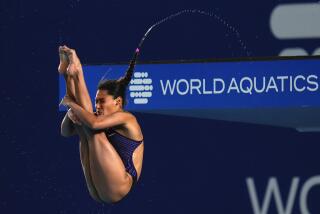Divers Into Topic Land in Hot Water
- Share via
MAR DEL PLATA, Argentina — Before leaving the United States--my country, right or wrong--I expressed some comments about Greg Louganis, the great American diver, and his terrifying plight.
I could have sworn that what I wrote was sympathetic. I said that our prayers were with Greg, that he was among the world’s great athletes and great guys.
But I also was of the opinion that he acted irresponsibly in not telling a doctor who was stitching his cut that his blood was contaminated, and in not at least letting his fellow athletes judge for themselves whether they wanted to dive into a pool in which he might have bled.
For saying this, I have been called everything from homophobic to an AIDS hysteric. Several readers wrote letters saying they wished it was me who would die.
There is a thin line between observation and declaration, and crossing it can be occupational hazard.
Mark Bradshaw has to watch what he says himself.
“Have you spoken to Greg?” he is asked.
“No.”
“Plan to?”
“No. I don’t see what good it would do.”
Bradshaw is the diver who followed Louganis onto the springboard at the Seoul Olympics of 1988, scant minutes after Louganis struck his head.
They were teammates and rivals, but Bradshaw knew nothing except that Louganis had just been hurt.
“You have to understand, this was the greatest diver ever. And I’m standing there thinking: ‘I can’t believe what I just saw,’ ” said Bradshaw, 32, during a break from practice here at the Complejo Natatorio swim complex, where competition began Sunday at the Pan American Games.
“There are definitely risks involved; that’s part of the sport. But here was the greatest diver in the world and he’s just hit his head on the board. I was right there. I saw it all happen. And now it’s my turn to go. There’s no time to think about it. I’m the next man up.”
“Were you rattled?” he is asked.
“Oh, yeah. Big time.”
“What do you remember?”
“I remember Greg cracking his head on the board. There was no blood on the board, no blood in the pool that I could see, no blood on the deck.”
“Did your dive go all right?”
“Well, at that point, I wasn’t doing very well. There were only two or three dives left in the qualifying and I was in something like 18th or 20th place, and only the first 12 go on to the finals. And now I’m standing there thinking, ‘Now Greg’s not going to make it, either.’ But when he came out of the water, he looked OK. He held his head, but that was about it.”
“So what happened?”
“That’s pretty weird in itself,” Bradshaw says. “When I look back on it, I think what happened to Greg kind of snapped me out of it. His accident made me concentrate that much harder. I finished seventh in the qualifying and ended up fifth in the finals.”
Bradshaw is nearing the end of his own career. He is a lantern-jawed Ohio State graduate born in Happy Camp, Calif., and current national three-meter springboard champion.
He has had a long and illustrious career, but that one dive doesn’t go away. Same as for Louganis.
“Ever watch Greg’s dive?”
“Never,” Bradshaw says. “I won’t watch it. It’s taboo. Bad luck.”
“Wish you’d known at the time what was going on with Greg?”
Bradshaw has been expecting the question. He nods and says: “Only from the standpoint that it’s better to have some information than no information. I don’t know. There was already so much to think about.”
It isn’t easy, being careful about every word you say.
“Think you’ll be asked about this a lot?” he is asked.
“Oh, I hope not,” Bradshaw says. “I hope this thing will die out.”
It isn’t easy, being careful about every word you say.
More to Read
Go beyond the scoreboard
Get the latest on L.A.'s teams in the daily Sports Report newsletter.
You may occasionally receive promotional content from the Los Angeles Times.






